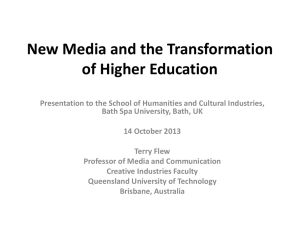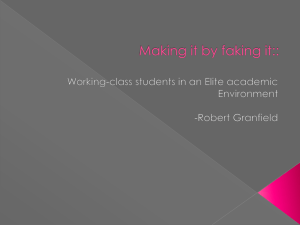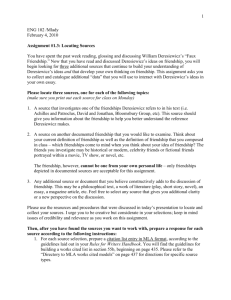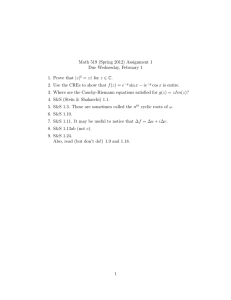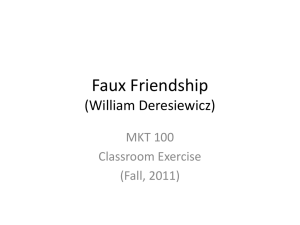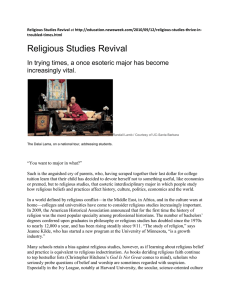Implications of the Marketization of Higher Education for Social
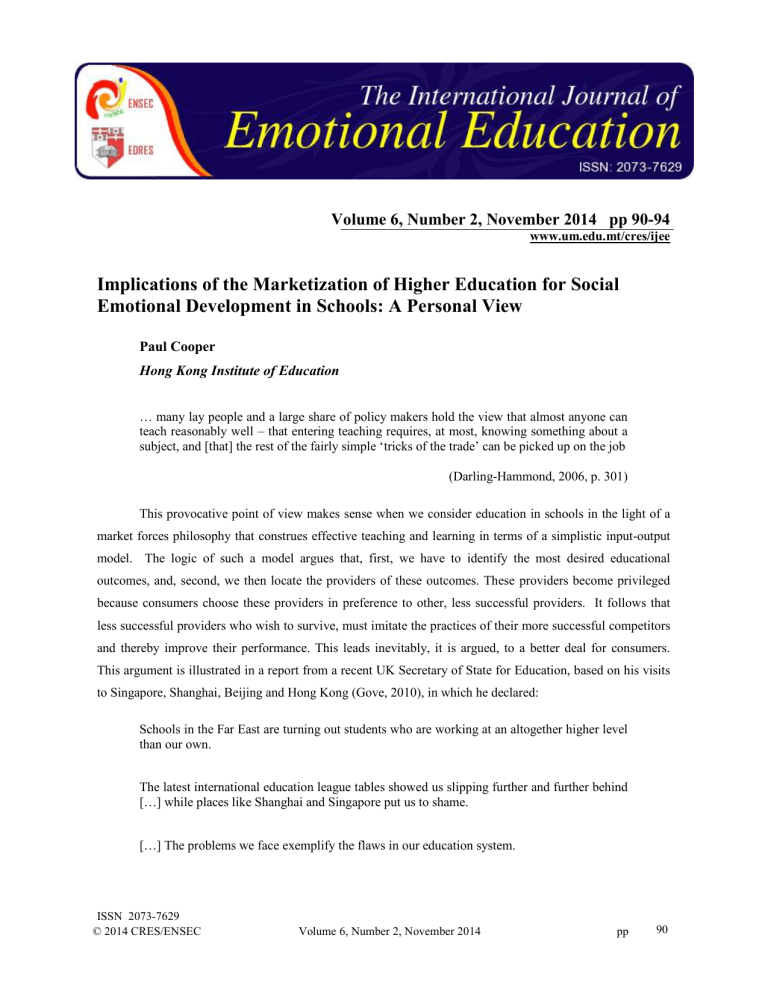
Volume 6, Number 2, November 2014 pp 90-94
www.um.edu.mt/cres/ijee
Implications of the Marketization of Higher Education for Social
Emotional Development in Schools: A Personal View
Paul Cooper
Hong Kong Institute of Education
… many lay people and a large share of policy makers hold the view that almost anyone can teach reasonably well – that entering teaching requires, at most, knowing something about a subject, and [that] the rest of the fairly simple ‘tricks of the trade’ can be picked up on the job
(Darling-Hammond, 2006, p. 301)
This provocative point of view makes sense when we consider education in schools in the light of a market forces philosophy that construes effective teaching and learning in terms of a simplistic input-output model. The logic of such a model argues that, first, we have to identify the most desired educational outcomes, and, second, we then locate the providers of these outcomes. These providers become privileged because consumers choose these providers in preference to other, less successful providers. It follows that less successful providers who wish to survive, must imitate the practices of their more successful competitors and thereby improve their performance. This leads inevitably, it is argued, to a better deal for consumers.
This argument is illustrated in a report from a recent UK Secretary of State for Education, based on his visits to Singapore, Shanghai, Beijing and Hong Kong (Gove, 2010), in which he declared:
Schools in the Far East are turning out students who are working at an altogether higher level than our own.
The latest international education league tables showed us slipping further and further behind
[…] while places like Shanghai and Singapore put us to shame.
[…] The problems we face exemplify the flaws in our education system.
ISSN 2073-7629
© 2014 CRES/ENSEC Volume 6, Number 2, November 2014 pp
90
[…] We can’t afford to waste time while our students fall further behind in the race for the best university places and jobs (para 6-10).
The terms of this discourse are, in themselves, very interesting. According to this view education is a
‘race’ for the ‘best university places and jobs’ (Gove, 2010, para. 10). Races, of course, produce very few winners but many losers. Winners can only be defined in relation to losers. It follows that educational hierarchies are, by definition, elitist and, therefore, exclusionary.
One of the consequences of applying free market principles within education systems, therefore, is the commodification of students, whereby schools compete to recruit the parents of the highest performing students who will achieve the best results in examinations, thereby contributing to the school’s status and perceived value (Lim & Tan, 1999). Because of the strong associations between socio-economic status, cultural capital and educational performance, marketization increases social segregation and decreases diversity in elite schools which increasingly become the preserve of privileged groups (Bates, Lewis, &
Pickard, 2011; Lim & Tan, 1999).
This empirical observation belies the claim that a market forces approach leads to the improvement of teaching quality and learning outcomes. Because it is based on a simplistic input-output model that pays scant attention to teaching and learning processes, it is an approach that rewards those who already advantaged and penalizes those who are disadvantaged. It is, therefore, a mechanism by which inequality is continually reproduced.
Unsurprisingly, this process and effect are further intensified in higher education, where elite universities recruit students primarily from elite schools. The same league-table mentality applies at international and national levels with universities vying for position against a range of criteria, the most important among which has tended to be research performance as demonstrated on the basis of the perceived quality of research activity and output of university staff. In some league tables, teaching is given a higher rating than in others, though even then, because measures of teaching quality tend to be based on student satisfaction surveys, such data cannot be taken as objective evidence of teaching quality (Maeroff, 2006).
Again, the challenges involved in trying to unravel a deeply complex issue are deftly side-stepped by recourse to a market forces model that takes for granted the idea that the customer’s (i.e. student’s) level of satisfaction with a product (i.e. teaching received) is a key indicator of the quality of the product.
It is important, of course, to be very careful to avoid the danger of falling into the trap of a different kind of elitism. Students’ views on the quality of their learning experience, at both school and university levels, are very important. Effective learning requires voluntary engagement by the learner, and it is the job of the teacher to motivate student engagement. Teachers (at all levels) need to be able to help students define their learning needs and work with them in identifying the best ways in which these can be met. Students’ views on the quality of such support for their learning are, therefore, valuable, though not necessarily conclusive. This is especially the case in market driven approaches to education where some students may prefer an easy path to the reward of a degree than one that involves challenges. From this point of view, students (i.e. customers) go to universities in order to obtain credentials that will enable them to enter certain occupations, and, if the degree certificate is provided by a prestigious university, all the better. There is of
ISSN 2073-7629
© 2014 CRES/ENSEC Volume 6, Number 2, November 2014 pp
91
course a cost to this approach, as the American author Deresiewicz (2014), himself an Ivy League graduate and former teacher at Yale University, states:
Our [the US] system of elite education manufactures young people who are smart and talented and driven, yes, but also anxious, timid and lost, with little intellectual curiosity and a stunted sense of purpose: trapped in a bubble of privilege, heading meekly in the same direction, great at what they are doing but with no idea why they are doing it (para. 5).
Being ‘great at what they are doing’, according to Deresiewicz (2014), involves, among other things, passing courses with high grades as a result of dogged and unquestioning adherence to assessment requirements. On the face of it, this does not appear to be such a bad thing. Surely, we want our students to work hard, don’t we? The problem is that ‘working hard’ in this context is less concerned with the challenges of deep critical and analytical engagement and more concerned with the techniques of ‘pleasing teacher’ by delivering what he or she wants. Such ‘learning’ techniques might include amongst others, presenting arguments that the tutor favours; relying on ‘crib’ texts rather than primary sources; the illegal use of stimulant medication to enhance cognitive sharpness; plagiarism and other forms of cheating. Such techniques may be experienced as legitimate by students in high pressure academic environments where the main purpose of participation is the acquisition of credentials as opposed to what Deresiewicz (2014) describes as the ‘larger project of intellectual discovery and development’, that is often claimed as the key purpose of a higher education.
For many of the elite students of Deresiewicz’s (2014) thesis, the Ivy League university experience is just a station on the well-worn track that many of them have been on since birth, and that will take them through to the ends of their ‘successful’ and materially rewarding lives. The Ivy League degree certificate is just a facet of the social identity that they need to project in order to justify their positions of power and privilege when they become leaders of corporations, high profile lawyers and other professionals, and, of course, influential politicians. What might have at one time have been a badge of intellectual distinction is now something quite different.
This is a far cry from Cardinal John Henry Newman’s (1852) idea of the university as a place where students learn to form ideas and opinions on the basis of critical thinking and rigorous debate, and where the pursuit of understandings that transcend popular ideologies and prejudices is of paramount importance. This is the kind of education that is characterized by the cultivation of intellectual awareness and mindfulness, the very antidotes to being ‘anxious, timid … lost’ and lacking in a sense of direction in life.
The failings that Deresiewicz (2014) describes are not, unfortunately, limited to elite universities.
This is clearly illustrated in a recent article in the diary section of the London Review of Books by distinguished author and critic Marina Warner (2014) on why she resigned from her academic post at a nonelite UK university. The core of her impassioned argument is that the modern market-driven university system undermines the quality of scholarship, research and teaching by subordinating these processes to the pursuit of financially motivated management targets which may change without notice. In Warner’s case scholarly activities that were in the previous year deemed prestigious and good for the university’s image, are suddenly sidelined as the university hierarchy seeks to place a greater emphasis on teaching. This volte face
ISSN 2073-7629
© 2014 CRES/ENSEC Volume 6, Number 2, November 2014 pp
92
means that she is faced with the choice of dropping the activities or taking unpaid leave in order to carry them out. On the same market forces theme, other academics complain about the pressure to publish in particular
‘high stakes’ journals and the negative impact that this has on the quality of their work by prioritizing the number and frequency of publications in so called ‘top’ journals over originality and innovation (Lawrence,
2008). Such an approach to scholarship, it is argued, encourages the worst kind of academic conservatism and hinders rather than facilitates the expansion of knowledge and understanding.
Clearly, docility and acquiescence to market forces are dominant at all levels of some of our modern education systems. This is in itself a source for serious concern because it implies a complete subversion of the fundamental mission of western education which is to enlighten and empower the learner, and in the case of universities, to generate new knowledge and ideas. This mission was perhaps best summed by John
Dewey (1897) when he stated:
I believe that education, […], is a process of living and not a preparation for future living.
I believe that the school must represent present life - life as real and vital to the child as that which he carries on in the home, in the neighborhood, or on the play-ground.
I believe that education which does not occur through forms of life, forms that are worth living for their own sake, is always a poor substitute for the genuine reality and tends to cramp and to deaden (para. 8-10).
Although Dewey is writing about schools, these words can apply equally well to universities where the pursuit of authentic understandings of the world we inhabit is the core purpose. ‘Authenticity’ in this context involves the application of rigorous habits of thought and a relentless adherence to the principle that all knowledge is contestable, meaning that the growth of knowledge often depends on a willingness to challenge orthodoxies and not simply settle for commonly held assumptions. In this respect, docility and passivity are fundamental enemies of positive social-emotional development, which depends on the development of an understanding that what we do as individuals has an impact on the world we inhabit, and that we can make choices about how we think, feel and act. If we consider that the best way to conduct ourselves is through unquestioning submission to the will of others, then we are doomed to the insecurities claimed by Deresiewicz (2014) to afflict many Ivy League students. It follows that schools need to awaken in their students a sense of individual purpose and a desire to engage with others (especially their parents, peers and teachers) in helping to make a positive difference in their world, starting with the school as a community that facilitates the positive engagement of all its members. Such an awakening will need to be built on a foundation of social-emotional security that is fostered and reinforced through the day to day interactions that take place in and around schools. The promotion of social-emotional well-being has thus to be seen not as an add-on, but as a core educational goal from which will grow the insight and motivation to engage with and overcome the challenges of everyday life.
It is, unfortunately, hard to imagine this happening in settings dominated by the institutional dysfunctions discussed in this paper. The league-table mentality by its very nature promotes insecurity at
ISSN 2073-7629
© 2014 CRES/ENSEC Volume 6, Number 2, November 2014 pp
93
both institutional and individual levels because it thrives on the delusion that quality can be construed in simplistic quantitative terms that are beyond question. Government ministers, university Vice Chancellors, university teachers, university students, school principals, school teachers and school students are all at enormous risk of being trapped in an endless tail chasing game that induces social discord and emotional distress and diverts attention from the problems of the world that education is supposed to equip us to address.
One way forward is to re-vitalize the public debate about the purposes of education and to emphasize the importance of education in shaping secure, confident, active, curious and engaged citizens who are willing and able to engage with the challenges of being a human being in the 21st century. This will, of course, be a lot harder than allowing market forces to make all of our decisions for us. It is likely to involve encouraging students in schools and universities to be more actively involved in the construction of their own learning experiences. In turn, this will require teachers and lecturers to be more active in developing more inclusive pedagogies. Above all, in education we need much less mindless devotion to market forces and much more vision about the power of education to transform and enrich lives to the benefit of everyone.
References
Bates, J., Lewis, S. & Pickard, A. (2011). Education Policy, Practice and Professionals. London: Continuum.
Darling-Hammond, L. (2006). Constructing 21st Century Teacher Education. Journal of Teacher Education,
57(3), 300-314.
Deresiewicz, W. (2014). Don’t send your kid to the Ivy league: The nation’s top colleges are turning our kids into zombies. New Republic. Retrieved on 3rd November 2014 from: http://www.newrepublic.com/article/118747/ivy-league-schools-are-overrated-send-your-kidselsewhere
Dewey, J. (1897). My Pedagogic Creed. School Journal, 54(3), 77-80. Retrieved on 3 rd
November 2014 from: http://dewey.pragmatism.org/creed.htm
Gove, M. (2010). My Revolution for Culture in Classroom. The Daily Telegraph. Retrieved on 30th October
2014 from: http://www.telegraph.co.uk/education/8227535/Michael-Gove-my-revolution-for-culturein-classroom.html
Lawrence, P. (2008). Lost in Publication: How measurement harms science. Ethics in Science and
Environmental Politics, 8(1), 9-11.
Lim, L. & Tan, J. (1999). The marketization of education in Singapore : prospects for inclusive education.
International Journal of Inclusive Education, 3(4), 339-351.
Maeroff, G. I. (2006). Beyond the Rankings: Measuring Learning in Higher education. The Hechinger
Institute on Education and the Media. New York: Teachers College, Columbia University. Retrieved on 30th October 2104 from: http://hechinger.tc.columbia.edu/primers/TeaglePrimer_092106.pdf
Newman, J. (1852). The Idea of a University: Defined and Illustrated. New York: Regnery Publications.
Warner, M. (2014). Diary. The London Review of Books, 36(17), 42-43.
ISSN 2073-7629
© 2014 CRES/ENSEC Volume 6, Number 2, November 2014 pp
94

